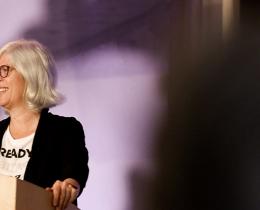International Women’s Day is celebrated around the world to honor women's accomplishments and name the work that still lies ahead to bring about gender equality.
Commemorated annually on March 8, International Women’s Day was initiated at the turn of the 20th century by women involved in the labor movement in the United States and Europe. They wanted to bring attention to the unfair working conditions of women, build support for universal suffrage, and end gender discrimination.
As we reflect on what’s needed to accelerate efforts in achieving equality, the time has come to build a stronger partnership between women and men; a partnership that acknowledges and embraces our interdependence, and that builds on our mutual interests in achieving gender equality.
Without strengthening our partnership across the gender divide, true equality will remain beyond our grasp. With so much important work still to accomplish, including ending gender violence, creating pay equity, and having equal representation in the institutions that shape our world, we need each other as allies.
And beyond needing allies, the kind of equality we are seeking is not just about making sure women get an equal piece of the pie, it’s about creating a new, more complete pie—together. True gender equality would expand the possibilities for both women and men, because we all suffer from rigid gender roles.
The women’s right’s movement has been successful in helping make visible the ways in which women suffer from gender discrimination. But men also suffer from gender inequality, and we need to bring that more fully into view because it is key to moving forward together.
James O'Neil, a developmental psychologist at the University of Connecticut, says that most men think that being a man is based on four impossible rules, originally summarized in 1976, by social psychologist Robert Brannon:
1. Don't be a sissy: You can never do anything that even remotely hints of the feminine.
2. Always win: Seek wealth, power, and status
3. Be a sturdy oak: Be reliable in a crisis like an inanimate object such as a rock, a pillar, or a tree.
4. Go for it: Be daring, aggressive, and take risks. Don't care what others think.
The growing gender research on men shows that not only are these impossible personal goals to attain, but they also create a lifetime of stress and fear for boys and men that can lead to unhappiness, aggression, poor relationships, and disease. And, in the public sphere, these goals can undermine building a peaceful society that aspires to take care of everybody and the planet we live on.
If we achieve gender equality, both women and men can be free to explore all 360 degrees of the human experience. As Michael Kimmel, a men’s studies scholar says, “masculinity could be better defined by how honorable, ethical, and responsible [a man] can be….[as] a caretaker of his family and community and to those he loves.” The data shows that this definition of masculinity lies underneath the hidden aspirations of most boys and men.
If we can forge a new vision for the final chapters of attaining gender equality that includes women and men as coauthors and partners, our chances for success are far greater—and we will all be the beneficiaries.
This year, in celebration of International Women’s Day, let’s strengthen our commitment to build a stronger partnership between women and men as a key strategy for achieving gender equality.
There are so many beautiful and powerful relationships to build on between spouses and partners, mothers and sons, fathers and daughters, coworkers, and community members, to take the next step across the gender divide—with new levels of curiosity, empathy, and, of course, comic relief, for understanding how rigid gender roles limit all of us, and gender equality can liberate everybody.



